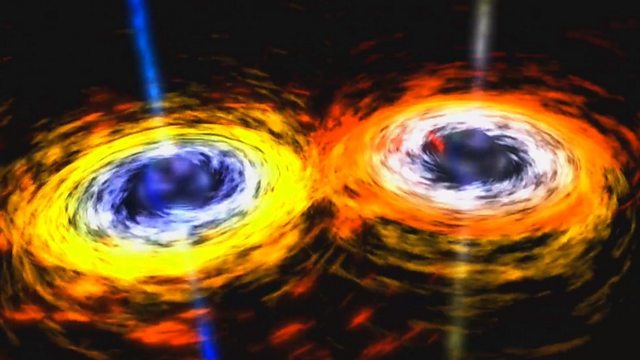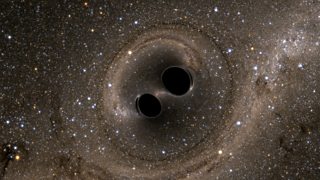Hearing the Universe for the First Time
LIGO; Horses know when you're angry; Neanderthal DNA may influence depression; Bacteria ÔÇśseeÔÇÖ light; Light flashes could stop jet lag; Climate change affects transatlantic flights
Scientists have announced a revolution in astronomy: LIGO ÔÇô the Laser Interferometer Gravitational-Wave Observatory ÔÇô has recorded signals of the gravitational waves resulting from two black holes colliding. Gravitational waves are tiny ripples in space time, which Albert Einstein predicted in his general theory of relativity over 100 years ago. Large bodies like black holes warp space-time around themselves, and when they collide, the distortions of the collision ripple outward at the speed of light. LIGO consists of two giant detectors, each eight kilometres in length, one in Louisiana and one in Washington State. The detectors are like microphones listening to the Universe, sensitive to waves coming in from all directions. Professor Sheila Rowan explains why this discovery is equivalent to developing an entirely new sense, allowing astrophysicists to ÔÇťhearÔÇŁ the universe for the first time.
Horses Know When You Are Angry
Domestication has enabled horses to distinguish human emotions, a new study shows. When the horses were shown pictures of angry human faces, they tended to look at them with their left eye ÔÇô which is associated with perceiving negative stimuli.
Neanderthal DNA May Influence Depression
Homo sapiens migrating out of Africa first mingled with Neanderthals around 50,000 years ago. A new study has identified Neanderthal genetic variants that may be responsible for conditions like depression, blood clotting and tobacco addiction in modern humans.
Pond Slime Bacteria Act Like Tiny Eyes
Biologists have solved the riddle of how a bacterium senses light and moves towards it. The entire organism acts like a tiny eyeball, focusing light on the far side of the cell.
Light Flashes Could Stop Jet Lag
Sleeping in front of a strobe light could help people realign their internal clock after travelling across time zones. Researchers found that an hour of flashlight therapy shifted volunteersÔÇÖ day-night cycle by up to two hours.
Climate Change Affects Transatlantic Flights
Air travel is an increasingly popular mode of transport, with thousands of planes up in the air at any given time. According to estimates, aviation contributes around two percent to global carbon dioxide emissions, adding to global warming. New research shows that this is actually a two-way street, with climate change also affecting planesÔÇÖ travel times. Rising temperatures will accelerate the jet stream ÔÇô a strong, high-altitude wind that travels across the Atlantic ÔÇô leaving westbound flights battling stronger headwinds. Dr Paul Williams has calculated that this will cause planes on transatlantic routes to spend an extra 2,000 hours in the air, using up $20 million worth of extra fuel and increasing emissions even further.
(Photo: ArtistÔÇÖs impression of two black holes colliding ┬ę Nasa)
Last on
More episodes
Previous
Broadcasts
- Thu 11 Feb 2016 20:32GMT91╚╚▒Č World Service UK DAB/Freeview, Online, Europe and the Middle East & Americas and the Caribbean only
- Thu 11 Feb 2016 21:32GMT91╚╚▒Č World Service West and Central Africa, Australasia, East Asia & South Asia only
- Fri 12 Feb 2016 02:32GMT91╚╚▒Č World Service Americas and the Caribbean
- Fri 12 Feb 2016 03:32GMT91╚╚▒Č World Service UK DAB/Freeview, Online, Europe and the Middle East & East Asia only
- Fri 12 Feb 2016 04:32GMT91╚╚▒Č World Service South Asia
- Fri 12 Feb 2016 05:32GMT91╚╚▒Č World Service Australasia
- Fri 12 Feb 2016 07:32GMT91╚╚▒Č World Service East and Southern Africa & Europe and the Middle East only
- Fri 12 Feb 2016 13:32GMT91╚╚▒Č World Service UK DAB/Freeview & Online only
- Fri 12 Feb 2016 14:32GMT91╚╚▒Č World Service Europe and the Middle East, East and Southern Africa, West and Central Africa, East Asia & South Asia only
Featured in...
![]()
Gravitational Waves—The Documentary, A New Ear on the Universe
The tiny ripples that hold a key to our understanding of the universe.
Podcast
-
![]()
Science In Action
The 91╚╚▒Č brings you all the week's science news.



